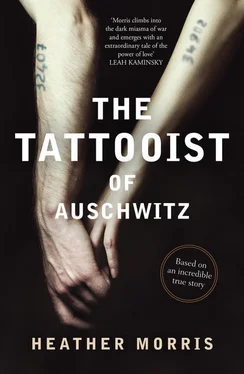‘You. Yes, you. Get up on the roof. You can work up there.’
The command is directed at Lale. Looking around, he spies a ladder going up to the roof. Two prisoners squat there, waiting to receive the tiles which are being shuttled up to them. The two men move aside as Lale clambers up. The roof consists only of wooden beams for supporting the tiles.
‘Be careful,’ one of the workmen warns him. ‘Move further up the roofline and watch us. It’s not difficult – you’ll soon get the hang of it.’ The man is Russian.
‘My name’s Lale.’
‘Introductions later, OK?’ The two men exchange a look. ‘You understand me?’
‘Yes,’ Lale replies in Russian. The men smile.
Lale watches as they receive the heavy clay tiles from the pair of hands poking over the lip of the roof, crawl to where the last tiles were laid and carefully overlap them, before moving back to the ladder for the next one. The Russian had been correct – it’s not difficult work – and it isn’t long before Lale joins them in accepting and laying the tiles. On the warm spring day only the hunger pains and cramps prevent him from matching the more experienced workers.
A few hours pass before they are permitted to take a break. Lale heads for the ladder but the Russian stops him.
‘It’s safer to stay up here and rest. You can’t be seen well this high up.’
Lale follows the men, who clearly know the best place to sit and stretch out: the corner where stronger timber was used to reinforce the roof.
‘How long have you been here?’ Lale asks as soon as they settle down.
‘About two months, I think. Hard to tell after a while.’
‘Where did you come from? I mean, how did you end up here? Are you Jewish?’
‘One question at a time.’ The Russian chuckles and the younger, larger worker rolls his eyes at the ignorance of the newcomer, yet to learn his place in the camp.
‘We’re not Jewish, we are Russian soldiers. We got separated from our unit and the fucking Germans caught us and put us to work. What about you? A Jew?’
‘Yes. I’m part of a large group brought in yesterday from Slovakia – all Jews.’
The Russians exchange a glance. The older man turns away, closing his eyes, raising his face to the sun, leaving it to his companion to continue the conversation.
‘Look around. You can see from up here how many blocks are being built and how much land they have to keep clearing.’
Lale pushes himself onto his elbows and observes the vast area contained within the electrified fence. Blocks like the one he is helping construct stretch out into the distance. He experiences a jolt of horror at what this place might become. He wrestles with what to say next, not wanting to give voice to his distress. He settles back down, turning his head away from his companions, desperate to bring his emotions under control. He must trust no one, reveal little about himself, be cautious…
The man watches him closely. He says, ‘I’ve heard the SS boasting that this is going to be the biggest concentration camp of all.’
‘Is that right?’ says Lale, forcing his voice above a whisper. ‘Well, if we’re going to build it together, you might as well tell me your name.’
‘Andor,’ he says. ‘And this big oaf with me is Boris. He doesn’t say much.’
‘Talking can get you killed here,’ Boris mutters as he stretches his hand out to Lale.
‘What else can you tell me about the people here?’ says Lale. ‘And who the hell are these kapos?’
‘You tell him,’ says Boris, yawning.
‘Well, there are other Russian soldiers like us, but not many, and then there are all the different triangles.’
‘Like the green triangle my kapo wears?’ Lale says.
Andor laughs. ‘Oh, the greens are the worst – they’re criminals: killers, rapists, that kind of man. They make good guards because they’re terrible people.’ He continues, ‘Others are here because of their anti-German political views. They wear a red triangle. You’ll see a few, not many, with a black triangle – they are lazy bastards and they don’t last long. And finally there is you and your friends.’
‘We wear the yellow star.’
‘Yes, you wear the star. Your crime is to be Jewish.’
‘Why don’t you have a colour?’ asks Lale.
Andor shrugs. ‘We’re just the enemy.’
Boris snorts. ‘They insult us by sharing our uniforms with the rest of you. They can’t do much worse than that.’
A whistle blows and the three men get back to work.
•
That night, the men in Block 7 gather in small groups, to talk, share what they’ve learned, and question. Several move to the far end of the hut where they offer prayers to their God. These mingle into something unintelligible. Are they praying for guidance, vengeance, acceptance? It seems to Lale that, without a rabbi to guide them, each man prays for what is most important to him. And he decides this is as it should be. He moves between the groups of men, listening, but taking no part.
•
By the end of his first day Lale has exhausted the knowledge of his two Russian co-workers. For the rest of the week he heeds his own advice: keeps his head down, does what he is asked, never argues. At the same time, he observes everyone and everything going on around him. It is clear to him, looking at the design of the new buildings, that the Germans lack any architectural intelligence. Whenever possible, he listens to the talk and gossip of the SS, who don’t know he understands them. They give him ammunition of the only sort available to him, knowledge, to be stored up for later. The SS stand around most of the day, leaning against walls, smoking, keeping only one eye on things. By eavesdropping he learns that Camp Commandant Hoess is a lazy bastard who hardly ever shows his face, and that accommodation for Germans at Auschwitz is superior to that at Birkenau, which has no access to cigarettes or beer.
One group of workers stands out to Lale. They keep to themselves, wear civilian clothes and speak to the SS without fearing for their safety. Lale determines to find out who these men are. Other prisoners never pick up a piece of wood or tile but instead walk casually around the compound on other business. His kapo is one such. How to get a job like that? Such a position would offer the best chance to find out what is going on in the camp, what the plans are for Birkenau and, more importantly, for him.
•
Lale is on the roof, tiling in the sun, when he spies his kapo heading in their direction. ‘Come on, you lazy bastards, work faster,’ Lale yells. ‘We’ve got a block to finish!’
He continues barking orders as the kapo appears below. Lale has made a habit of acknowledging him with a deferential nod of the head. On one occasion he received a short nod back. He has spoken to him in Polish. At the least, his kapo has accepted him as a subservient prisoner who will not cause problems.
With a half-smile the kapo makes eye contact with Lale and beckons him down from the roof. Lale approaches him with his head bowed.
‘Do you like what you’re doing, on the roof?’ says the kapo.
‘I’ll do whatever I’m told to do,’ replies Lale.
‘But everyone wants an easier life, yes?’
Lale says nothing.
‘I need a boy,’ the kapo says, playing with the fraying edge of his Russian army shirt. It’s too big for him, chosen to make the little man appear larger and more powerful than those he must control. From his gap-toothed mouth Lale experiences the pungent smell of partially digested meat.
‘You will do whatever I ask you to. Bring me my food, clean my boots, and you must be beside me whenever I want you. Do this and I can make life easier for you; fail me and there will be consequences.’
Читать дальше






![Хезер Моррис - Дорога из Освенцима [litres]](/books/397846/hezer-morris-doroga-iz-osvencima-litres-thumb.webp)
![Хезер Димитриос - Токсичный роман [litres]](/books/408645/hezer-dimitrios-toksichnyj-roman-litres-thumb.webp)




